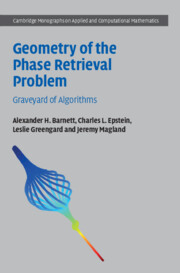Book contents
- Frontmatter
- Contents
- Preface
- Acknowledgments
- 1 Introduction
- Part I Theoretical Foundations
- Part II Analysis of Algorithms for Phase Retrieval
- 6 Introduction to Part II
- 7 Algorithms for Phase Retrieval
- 8 The Discrete, Classical, Phase Retrieval Problem
- 9 Phase Retrieval with the Nonnegativity Constraint
- 10 Asymptotics of Hybrid Iterative Maps
- Part III Further Properties of Hybrid Iterative Algorithms and Suggestions for Improvement
- References
- Index
8 - The Discrete, Classical, Phase Retrieval Problem
from Part II - Analysis of Algorithms for Phase Retrieval
Published online by Cambridge University Press: 21 April 2022
- Frontmatter
- Contents
- Preface
- Acknowledgments
- 1 Introduction
- Part I Theoretical Foundations
- Part II Analysis of Algorithms for Phase Retrieval
- 6 Introduction to Part II
- 7 Algorithms for Phase Retrieval
- 8 The Discrete, Classical, Phase Retrieval Problem
- 9 Phase Retrieval with the Nonnegativity Constraint
- 10 Asymptotics of Hybrid Iterative Maps
- Part III Further Properties of Hybrid Iterative Algorithms and Suggestions for Improvement
- References
- Index
Summary
The goal of this chapter is to examine the behavior of algorithms defined by hybrid iterative maps in the phase retrieval problem, per se. We begin by considering these maps in a variety of simple geometric situations, which demonstrate both the range of behaviors for iterates of these maps, and also how they are related to the local geometry near to the point of intersection. When these maps converge, they converge to points on a set called the center manifold. After consideration of the model problems, we turn to an analysis of the linearization of a hybrid map near to points on the center manifold. In a numerical study, we show that, even at an attractive fixed point, the linearized map may fail to be a contraction. Its eigenvalues are complex numbers with modulus less than one, but the basis of eigenvectors is very far from orthogonal. The chapter concludes with extensive numerical experiments exploring the complexities of hybrid iterative maps in realistic phase retrieval problems utilizing the support constraint.
- Type
- Chapter
- Information
- Geometry of the Phase Retrieval ProblemGraveyard of Algorithms, pp. 147 - 190Publisher: Cambridge University PressPrint publication year: 2022



